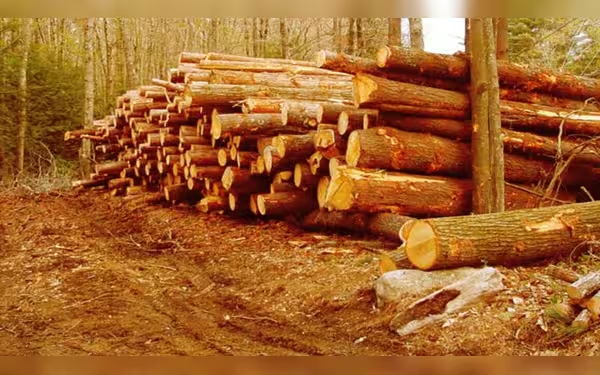Thursday, November 7, 2024 07:34 AM
SCN Urges Action Against Deforestation in Khyber Pakhtunkhwa
- SCN demands accountability for Khyber Pakhtunkhwa deforestation.
- Environmentalists condemn government's inaction on timber clearance.
- Supreme Court highlights negligence in forest protection.
 Image Credits: thefridaytimes
Image Credits: thefridaytimesSCN calls for accountability over alarming deforestation rates in Khyber Pakhtunkhwa, urging immediate action to protect vital forest resources.
The Sarhad Conservation Network (SCN), a prominent advocacy group in Khyber Pakhtunkhwa, has raised serious concerns regarding the alarming rate of deforestation in the province. This issue has come to light following a report published by the English-language daily Dawn on October 31, which revealed that the provincial government has approved the clearance of over six million cubic feet of timber. Such actions have led to significant environmental degradation, prompting strong condemnation from environmentalists and experts alike.
Former head of the International Union for Conservation of Nature (IUCN), Mohammand Rafiq, expressed his dismay, stating, "The clearance of over six million cubic feet of timber, resulting in irreparable environmental degradation, is a stark reminder of the government's continued inaction and complicity in ecological vandalism." This statement underscores the gravity of the situation, as the report cited a government document submitted to the Supreme Court, detailing the approval for tree cutting over the past five years.
The Pakistan Tehreek-e-Insaf (PTI), which has been in power in Khyber Pakhtunkhwa for nearly a decade, has faced criticism for its handling of environmental issues. Climate change expert Dr. Khalid Khan described the government's actions as "scandalous; nothing short of a betrayal of public trust." This sentiment reflects a growing frustration among citizens and environmental advocates who feel that their concerns are being ignored.
Since the beginning of 2023, the SCN has been actively gathering evidence and raising awareness about the widespread deforestation occurring in the province. Dr. Adil Zareef, the Convenor of the SCN, stated, "The news item substantiates our greatest fears and observations, to which the authorities have, by and large, turned a blind eye and a deaf ear." He also highlighted another concerning project involving the concreting of Peshawar Road, which lacks proper consultation with experts.
The SCN has consistently warned about the dire consequences of deforestation, which include threats to biodiversity, climate change, and the livelihoods of local communities. Dr. Zareef emphasized the need for the provincial climate change department to ensure that all development projects comply with guidelines addressing climate challenges, such as increasing weather extremes that threaten residents' lives.
Dr. Saima Hashim, another climate change expert, pointed out that this environmental crisis reflects deeper systemic issues, including weak governance and corruption. She stated, "This environmental catastrophe reflects deeper systemic failures, including weak governance and regulatory frameworks, corruption and cronyism, lack of transparency and public engagement, and inadequate enforcement mechanisms." The SCN is calling for an immediate halt to all deforestation activities and a thorough investigation into the government's actions.
The Supreme Court has also taken notice of the rapid decline in forest cover in Pakistan, suggesting negligence on the part of the forest department, which is supposed to protect these vital resources. The court emphasized the importance of forests in maintaining natural rainfall catchment areas and preventing flooding and landslides. It warned that deforestation not only leads to environmental disasters but also exacerbates climate change, which is a pressing issue for Pakistan, one of the countries most vulnerable to its effects.
In 2023, the SCN presented a pictorial report on deforestation to the former federal Minister for Climate Change, Ms. Sherry Rehman, urging her to take action against the entrenched timber mafia operating within the KP government. The SCN has also organized seminars and documentaries to raise awareness about this critical issue.
As the situation unfolds, it is crucial for the government and relevant authorities to take immediate action to protect Khyber Pakhtunkhwa's forests. The voices of environmental advocates and concerned citizens must be heard, and effective measures must be implemented to ensure the preservation of natural resources for future generations. The fight against deforestation is not just about saving trees; it is about safeguarding the environment, biodiversity, and the livelihoods of countless individuals who depend on these resources.













